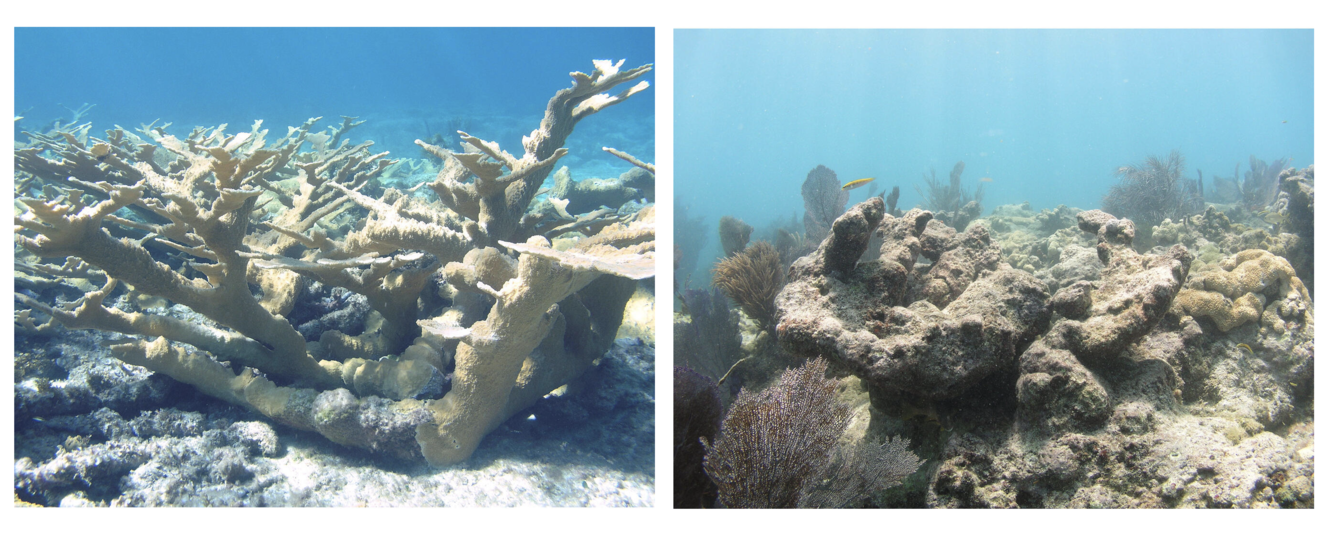Reef Metagenomics
In nature, microbes typically exist in communities made up of many different types of microorganisms (for example, bacteria, viruses, etc), all interacting with and influencing one another. Therefore, in order to understand the role that microbes play in an environment, it is often important to think of microbes operating as complex communities rather than as individual microorganisms.
Ribosomal gene amplicon surveys
One tool that we use to investigate microbial communities is ribosomal gene amplicon surveys, a process that examines the barcoding genes that are present in microbial DNA. This approach allows us to characterize both microbial community diversity and structure. However, although amplicon surveys can tell us what microbes are present in a sample, they can’t tell us much about what those microbes are doing -- to answer that question, we need to use metagenomics.
Metagenomics
Another tool we use to study microbes is metagenomics, which is the study of all microbial genes that are present in a particular organism (i.e., the “host”) or habitat. Metagenomic techniques uncover not only “who is there,” but also some level of “what they are doing,” by comparing sequenced genes against databases of known genes with described functions.

How Is Project MERMAID Applying These Tools to Better Understand Coral Reefs?
Using samples from healthy and degraded reefs, our work will compare taxonomic and functional microbial genetic information against environmental factors such as nutrient levels, salinity, and water quality metrics to uncover new linkages and identify environmental indicators that help us understand, better predict, and manage reef decline. These techniques will help to decipher the roles microbes play in processes such as coral disease, submarine groundwater discharge, calcification, and dissolution.
Coral Reef Project
Coral Microbial Ecology
Coral Reef Ecosystem Studies (CREST)
Reef History and Climate Change
Physicochemical controls on zones of higher coral stress where Black Band Disease occurs at Mākua Reef, Kauaʻi, Hawaiʻi Physicochemical controls on zones of higher coral stress where Black Band Disease occurs at Mākua Reef, Kauaʻi, Hawaiʻi
In nature, microbes typically exist in communities made up of many different types of microorganisms (for example, bacteria, viruses, etc), all interacting with and influencing one another. Therefore, in order to understand the role that microbes play in an environment, it is often important to think of microbes operating as complex communities rather than as individual microorganisms.
Ribosomal gene amplicon surveys
One tool that we use to investigate microbial communities is ribosomal gene amplicon surveys, a process that examines the barcoding genes that are present in microbial DNA. This approach allows us to characterize both microbial community diversity and structure. However, although amplicon surveys can tell us what microbes are present in a sample, they can’t tell us much about what those microbes are doing -- to answer that question, we need to use metagenomics.
Metagenomics
Another tool we use to study microbes is metagenomics, which is the study of all microbial genes that are present in a particular organism (i.e., the “host”) or habitat. Metagenomic techniques uncover not only “who is there,” but also some level of “what they are doing,” by comparing sequenced genes against databases of known genes with described functions.

How Is Project MERMAID Applying These Tools to Better Understand Coral Reefs?
Using samples from healthy and degraded reefs, our work will compare taxonomic and functional microbial genetic information against environmental factors such as nutrient levels, salinity, and water quality metrics to uncover new linkages and identify environmental indicators that help us understand, better predict, and manage reef decline. These techniques will help to decipher the roles microbes play in processes such as coral disease, submarine groundwater discharge, calcification, and dissolution.





